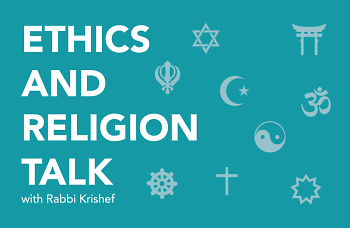In Judaism, lashon hara, gossip (literally, evil speech), is roughly defined as any speech, true or false, which damages somebody’s reputation. In general, such speech is prohibited, unless it serves the larger purpose of protecting or saving somebody from harm. Volumes have been written about permitted and prohibited speech according to the strict application of this Jewish ethic. In fact, much of what you read in any news source crosses this line. Were it not for stories of allegations against the character of political leaders, business leaders, and media figures, our news feeds would be virtually empty!
The profession of journalist has a calling to shine a spotlight on any and all aspects of society under the belief that transparency fosters a higher standard of behavior. But can journalists cross the line from reporting the news to spreading lashon hara? I’m wondering about a recent story (“Grand Rapids man, alleged leader of plot to kidnap Gov. Whitmer, had to be ‘insane,’ boss says,” posted 10/8/20) in the Grand Rapids Press, following up reports about the plot to kidnap the Governor. The story focused on the meeting that was held at in Grand Rapids. A previous story referred to the location of this meeting as “a shop in Grand Rapids,” but the follow-up identified the shop, named its location, and featured a picture of the store and its owner.
According to the follow-up story, the owner was not involved in the kidnapping plot. Apparently, however, his name and the store’s name had been featured in other media reports. The reporter noted that the owner spent the day after the story broke fielding calls from media, despite having work he needed to do. Because his store had been named, customers apparently wondered whether he might have been involved. Consequently, he needed to assure customers that his business is safe and he had no part in the alleged plot. He said that it’s been hard enough [to run a business] with the coronavirus pandemic.
Did the media outlets which named the shop act irresponsibly by doing so? Was it an essential piece of information, or was it included only to draw in readers by demonstrating how close to home the plot was? Did Mlive’s follow-up story, prominently featuring a picture of the store, do more harm to its reputation, or did it help to repair damage done by other media reports? And what is the role of the consumer? By reading and watching stories which damage people’s reputations without serving any higher purpose, Jewish ethics would claim that we become part of the problem. The only power we have to affect the media comes from our eyeballs and our pocketbooks. We can support, with our subscription dollars, news sources that make responsible decisions regarding what news to report and how to write the story. And we can refrain from tuning in to media outlets that consistently sensationalize stories with information that damages reputations without just cause.
The Reverend Colleen Squires, minister at All Souls Community Church of West Michigan, a Unitarian Universalist Congregation, responds:
“Unitarian Universalism draws from many sources, one being Judaism. My response uses the Rabbi’s understanding of gossip as evil speech that damages someone's reputation. I agree gossip is dangerous and irresponsible.
“I understand the Rabbi’s discomfort for the shop owner having to deal with irresponsible journalism but for UUs putting someone’s life at risk is cause for greater critical concern.
"President Trump was guilty of irresponsible speech by damaging Governor Whitmer’s reputation and putting her life at risk. The President singled out our Governor last March, saying he has a "big problem" with the "young, a woman governor" in Michigan. The President insultingly called her 'Half' Whitmer" in a tweet saying she was in "way in over her" head and "doesn't have a clue." He wanted to undermine her leadership. Contrary to the President's words a recent WDIV/Detroit News poll shows 61% of Michigan voters support Gov. Whitmer’s handling of the COVID-19 pandemic.”
Father Kevin Niehoff, O.P., a Dominican priest who serves as Judicial Vicar, Diocese of Grand Rapids, responds:
“The fundamental problem with gossip is that it is not respectful to the soul of another human being. Because gossip is typically inaccurate information about another person it may leads to scandal, i.e., leading another person into sin by transmitting untruthful information. The sin is a violation the Ninth Commandment of the Decalogue, “thou shall not covet anything that is your neighbor’s.
“Civil law and the law of the Catholic Church align with the assertion that people have not only the right to their good name but also the defense of that good name. Catholics teach that all human beings are created in the image and likeness of God. Therefore, all are deserving of respect. My parents taught me, ‘if you do not have anything good to say about another person, then say nothing.’ I have finally come to realize I was being taught to respect the Ninth Commandment.”
This column answers questions of Ethics and Religion by submitting them to a multi-faith panel of spiritual leaders in the Grand Rapids area. We’d love to hear about the ordinary ethical questions that come up in the course of your day as well as any questions of religion that you’ve wondered about. Tell us how you resolved an ethical dilemma and see how members of the Ethics and Religion Talk panel would have handled the same situation. Please send your questions to [email protected].
The Rapidian, a program of the 501(c)3 nonprofit Community Media Center, relies on the community’s support to help cover the cost of training reporters and publishing content.
We need your help.
If each of our readers and content creators who values this community platform help support its creation and maintenance, The Rapidian can continue to educate and facilitate a conversation around issues for years to come.
Please support The Rapidian and make a contribution today.
